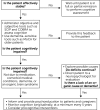Cognition in Bipolar Disorder: An Update for Clinicians
- PMID: 38695003
- PMCID: PMC11058946
- DOI: 10.1176/appi.focus.20230012
Cognition in Bipolar Disorder: An Update for Clinicians
Abstract
Bipolar disorder is associated with cognitive deficits, which persist across mood states and affect functional outcomes. This article provides an overview of recent progress in measuring cognition in bipolar disorder and its implications for both research and clinical practice. The authors summarize work conducted over the past decade that has helped guide researchers and clinicians in the appropriate measurement of cognitive functioning in bipolar disorder, the design of research studies targeting this domain for treatment, and the implementation of screening and psychoeducational tools in the clinic. Much of this work was conducted by the International Society for Bipolar Disorders Targeting Cognition Task Force. Here, the authors also highlight the need for clinicians to be informed about this aspect of illness and to be equipped with the necessary information to assess, track, and intervene on cognitive problems when appropriate. Finally, the article identifies gaps in the literature and suggests potential future directions for research in this area.
Keywords: Bipolar and Related Disorders; Cognition/Learning/Memory; Guidelines; Quality of life.
Copyright © 2023 by the American Psychiatric Association.
Conflict of interest statement
Dr. Burdick reports receiving an honorarium from Breakthrough Discoveries for Thriving with Bipolar Disorder (BD2) for her role as Scientific Director for the Integrated Network. Dr. Nicoloro-SantaBarbara reports receiving consulting fees from Cogent Biosciences. Dr. Miskowiak reports receiving consultancy fees for her advisory work for Gedeon Richter, Janssen, Angelini Pharma, and Lundbeck. Dr. Goldstein acknowledges his position as RBC Investments Chair in Children’s Mental Health and Developmental Psychopathology at The Centre for Addiction and Mental Health (CAMH), a joint Hospital-University Chair between the University of Toronto, CAMH, and the CAMH Foundation. The other authors report no financial relationships with commercial interests.
Figures

References
-
- Arts B , Jabben N , Krabbendam L , et al. : Meta-analyses of cognitive functioning in euthymic bipolar patients and their first-degree relatives . Psychol Med 2008. ; 38 : 771 – 785 - PubMed
-
- Harvey PD , Wingo AP , Burdick KE , et al. : Cognition and disability in bipolar disorder: lessons from schizophrenia research . Bipolar Disord 2010. ; 12 : 364 – 375 - PubMed
-
- Stefanopoulou E , Manoharan A , Landau S , et al. : Cognitive functioning in patients with affective disorders and schizophrenia: a meta-analysis . Int Rev Psychiatry 2009. ; 21 : 336 – 356 - PubMed
-
- Krabbendam L , Arts B , Van Os J , et al. : Cognitive functioning in patients with schizophrenia and bipolar disorder: a quantitative review . Schizophr Res 2005. ; 80 : 137 – 149 - PubMed
-
- Burdick KE , Goldberg TE : Overview and introduction: dimensions of cognition and measures of cognitive function ; in Cognitive Dysfunction in Bipolar Disorder: A Guide for Clinicians . Edited by Goldberg JF , Burdick KE . Washington, DC: , American Psychiatric Publishing; , 2008. , pp 1 – 22
Publication types
Grants and funding
LinkOut - more resources
Full Text Sources
Miscellaneous
